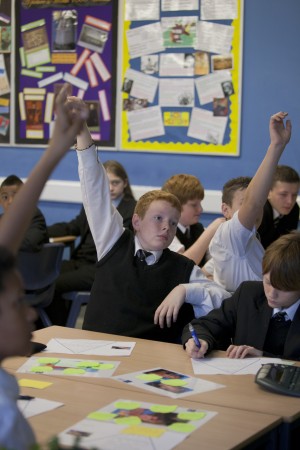Why did we choose this research?
Despite widespread teaching of the Holocaust in schools around the world, systematic research exploring what young people actually make of this complex and emotionally challenging subject had not been conducted. Our innovative project, the first national research into secondary school students’ knowledge and understanding of the Holocaust, addresses this shortcoming in robust and meaningful ways.
Early preparations
This research commenced in 2013, following a number of early exploratory focus groups and later a series of pilot studies to develop and refine the scales within the survey. In particular, two extensive pilot studies were conducted in July and October 2013, and provided the opportunity to determine the extent that students could understand the survey questions, enabled the reliability of the scales to be explored using statistical analyses, and allowed the research team to evaluate the practicalities of using an online version of the survey.
What method did we use?
Using a survey, completed by more than 8,000 secondary school students from 74 schools, we rigorously measured students’ knowledge and attitudes using both established and specialised scales of measurement which were developed in close collaboration with the Centre’s teaching team. The main themes in the survey are also being explored in greater depth, through a number qualitative thematic inquiries, which will extend and enrich insights from the main survey.
The primary aim of the project has been to explore students knowledge and understanding of the Holocaust. However, we were also interested in examining how their knowledge/understanding is related to other potentially salient variables, such as attitudes towards ‘out-groups’ and beliefs in a ‘just world’. Students’ attitudes to learning about the Holocaust have also been examined, and we have sought to frame this by investigating their attitudes towards the purpose of education more generally.
The research questions included:
- What do students know and understand about the Holocaust? (How confident are they with their knowledge/understanding?)
- Is there a relationship between students’ beliefs in a just world and their level of knowledge/understanding of the Holocaust?
- Is there a relationship between students’ attitudes towards ‘out-groups’ and their level of knowledge/understanding of the Holocaust?
- Is there a relationship between students’ attitudes towards learning about the Holocaust and their level of knowledge/understanding of the Holocaust?
We also conducted a series of in-depth interviews with more than 200 young people to help us build the most detailed and authoritative national portrait ever created of students’ knowledge and understanding of an important historical event.
Our ground-breaking research has already influenced government policy
In January 2015, the cross-party Prime Minister’s Holocaust Commission released a report outlining their findings and recommendations following a national call for evidence. The report recognised the work of our Centre, singling out our research and teacher education programmes as ‘world-class’ and highlighting how we are uniquely placed to respond to the actual issues faced by teachers and learners in the classroom:
‘The Centre is part of UCL’s Institute of Education, ranked number one worldwide for education in the QS 2014 World University Rankings (1) . It is the only institution in the world to combine large-scale national research into the challenges of teaching and learning about the Holocaust, with programmes specifically designed to meet these classroom needs’. (2)
In addition, the Commission recognised that our Centre provides ‘world class research, teacher education, MA, PhD and “Beacon Schools” programmes’ free of charge to secondary teachers in workshops and events across England, and all of these courses are uniquely informed by our ongoing world class research into Holocaust education.
(1) The UCL Institute of Education has also been ranked number one worldwide for education in the QS 2015 World University Rankings.
(2) Britain’s Promise to Remember, The Prime Minister’s Holocaust Commission Report January 2015, page 29.
Our thanks to all those who have been involved
The UCL Centre for Holocaust Education would like to thank all of the teachers and students who have been involved in this pioneering research. Over 9,500 students have participated in this research project by taking part in pilot studies, completing the survey, and sharing their views in focus groups. This has enabled us to carry out the largest study of students’ knowledge and understanding of the Holocaust anywhere in the world – so many thanks to all of the students who have contributed.

